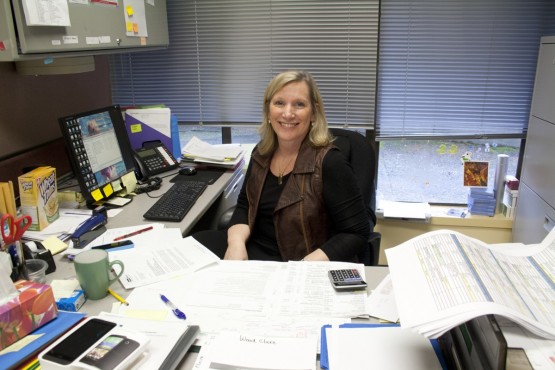After dealing with inadequate funding in 2014, the Island Sexual Health Clinic (ISHC) on Quadra Street says that they are in a much better financial situation after deliberate staff changes and cutbacks in advertisement.
“We found ourself in a bit of a big budget deficit to the point where we were concerned that we were going to have to change services and maybe even halt them,” said Jennifer Gibson, the co-ordinator of community education services at the ISHC.
The clinic has operated in Victoria for over 45 years to provide full services and support of sexual health needs for all ages, genders, orientations, identities, and abilities. The demand for their services such as pap, cervical, pelvic, testicular, and breast exams, as well as birth control, and IUD insertion increases each year.

Island Sexual Health Society executive director Bobbi Turner poses in her office. The clinic, in operation for over 45 years, has cut back on staff and advertising to improve its finances after funding cuts. Photo by Sarah Allan (Photo Editor)
The ISHC and it’s affiliated society (Island Sexual Health Society) receives funding for their services from a variety of outlets such as the United Way, the Vancouver Island Health Authority (VIHA), and fundraising efforts. In 2014, the funding that they received no longer supported their demand to serve over 27 000 clients a year.
However, the clinic found ways to cut costs and reformatted the budget that came from the VIHA. Rather than receiving payment quarterly, they are now given the total sum at the beginning of the year and a new treasurer on the board of directors delegates the funds appropriately. In addition, staff cuts were made in order to continue services.
“[This] allowed us to then manage some of the debt that we’d accrued from not being able to pay it in the past,” said Gibson, “So, we’re definitely in a better place financially.”
The ability to keep services running has assisted thousands of clients in the Greater Victoria area including Giselle Kiraly, a second-year student at UVic. She says she heard about the ISHC on a bus ad, and took advantage of their education program surrounding birth control to choose the best option for her.
“They were very helpful. And they were extra educational too,” said Kiraly of her experience at the ISHC. “It’s like going to class for [birth control].”
The clinic receives program-based funding and, therefore, has no resources to run fundraising campaigns to boost advertising. This means that in the future, the clinic may not be able to reach out to those who need their services.
The clinic continues to focus on education and health literacy as well as their clinical services to promote an overall better sexual health care system within the Victoria community.
Gibson hopes in the future “that [ISHC is] supported in terms of financial stability so we can have that sustainability, so that the continuum of services aren’t jeopardized,” and for “a recognition of the value of sexual health care.”
More information about services and donation methods for the ISHC can be found on their website.






